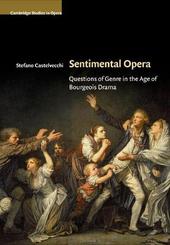
|
Sentimental Opera: Questions of Genre in the Age of Bourgeois Drama
Paperback / softback
Main Details
| Title |
Sentimental Opera: Questions of Genre in the Age of Bourgeois Drama
|
| Authors and Contributors |
By (author) Stefano Castelvecchi
|
| Series | Cambridge Studies in Opera |
|---|
| Physical Properties |
| Format:Paperback / softback | | Pages:297 | | Dimensions(mm): Height 245,Width 170 |
|
| Category/Genre | Opera |
|---|
| ISBN/Barcode |
9781108461832
|
| Classifications | Dewey:782.1 |
|---|
| Audience | | Professional & Vocational | |
|---|
| Illustrations |
Worked examples or Exercises; 17 Printed music items; 13 Halftones, unspecified; 13 Halftones, black and white
|
|
Publishing Details |
| Publisher |
Cambridge University Press
|
| Imprint |
Cambridge University Press
|
| Publication Date |
29 March 2018 |
| Publication Country |
United Kingdom
|
Description
Sentimental Opera is a study of the relationship between opera and two major phenomena of eighteenth-century European culture - the cult of sensibility and the emergence of bourgeois drama. A thorough examination of social and cultural contexts helps to explain the success of operas such as Paisiello's Nina as well as the extreme emotional reactions of their audiences. Like their counterparts in drama, literature and painting, these works brought to the fore serious contemporary problems including the widespread execution of deserters, the treatment of the insane, and anxieties relative to social and familial roles. They also developed a specifically operatic version of the dominant language of sensibility. This wide-ranging study involves such major cultural figures as Goldoni, Diderot and Mozart, while refining our understanding of the theatrical genre system of their time.
Author Biography
Stefano Castelvecchi is Lecturer in Music at the University of Cambridge and a Fellow of St John's College. He has published critical editions of works by Rossini and Verdi and various articles on eighteenth- and nineteenth-century Italian opera. His edition of Abramo Basevi's The Operas of Giuseppe Verdi (1859) is forthcoming.
Reviews'A valuable contribution not only to the study of late eighteenth-century opera but to our awareness of the priorities, absorptions and obsessions of cultured Europe on the eve of the French Revolution.' The Times Literary Supplement
|